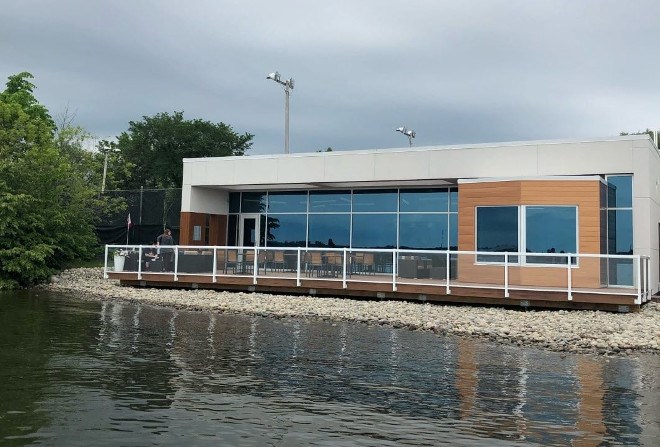More than a century after Sault Ste. Marie residents started the city’s first boating club, the waterfront site where it once flourished has returned to its roots, transforming into a multi-purpose site encouraging education, tourism and corporate functions.
In June, Sault College cut the ribbon on its $2.3-million Waterfront Adventure Centre, located along the St. Mary’s River in the city’s east end.
Designed by local architect David Ellis and constructed by Barban Construction, the centre is comprised of two buildings with a combined space of more than 5,000 square feet and adorned with wood and neutral-coloured cladding to blend in with its surroundings.
It’s been designed with multiple purposes in mind. Though primarily accessed by students in the college’s natural environment programs, it’s also open for use by the public.
Katie Campbell, the centre’s supervisor of programming and event planning, said in the five months it’s been open, the centre has hosted a number of meetings for the college’s board of governors and departmental staff.
But with its sweeping panoramic of the river, the site is poised to become a popular draw for gatherings outside the college realm.
“We’re a nice spot to host a meeting – with a view,” Campbell said.
Known most recently as the Rotary/YMCA Tennis and Aquatics Club (RYTAC), the site has been used for water-related leisure activities since 1902, when the Sault Boating Club built the original boathouse.
Over its life, the facility was twice destroyed by fire before the site was purchased by a local philanthropic organization and bequeathed to Sault College in 2014.
After the school put forward a case for its redevelopment, the funding started to come in: $897,000 from the Northern Ontario Heritage Fund Corp., $710,000 from the Ministry of Training, Colleges and Universities, $417,000 from Sault College, and $104,000 in private donations.
Construction on the facility began in 2017.
Want to read more stories about business in the North? Subscribe to our newsletter.
Since its opening, Campbell said, more than 1,000 unique visitors have used the facility, including 200 international students, although that doesn’t include those in the community just visiting to enjoy a coffee on the patio.
“A lot of people have that connection to the space because of RYTAC and the history here,” she said. “So they certainly see the reimagination of a familiar place.”
Anticipating demand from corporate clientele, the centre has put together a number of teambuilding, communication and co-operative learning packages.
“We cater each corporate package to the staff team or the sports team that we’re catering to,” Campbell said. “We can get food for them, and include that in the package, and we’ve got a nice little café area where people can lounge before, during or after.”
Most packages have some kind of paddling component, whether it’s teams of people working together to paddle a canoe, or individual kayakers or paddleboarders travelling to a common destination. Clients could also choose to have a staff member take them on a guided tour of the river, Campbell said.
In addition to the watersports, there are courts on site for tennis and pickleball, as well as a beach volleyball area. Staff have put together a number of games and activities to encourage communication and teamwork.
Named the Franklin Prouse Centre for the late local businessman who donated funds to the project before his death in 2018, the facility offers classrooms, a small kitchen, an open area with seating and a patio.
The onsite Ziibi Café, which serves dessert and coffee from nearby St. Joseph Island Coffee Roasters, gets its name from the Ojibwe word for “river.”
The open area can accommodate 50 people for a cocktail party or 40 for a sit-down meeting or dinner.
Although they've contracted a number of local caterers for various summer events, Campbell said plans are in the works to have food permanently on site for next year, either through the café or via a food truck. The centre will also apply to become licensed to serve alcohol.
“We’re excited about the capacity for expansion with that, because people can come and have a drink after their game or it can be built in for food and beverage as part of an event,” Campbell said.
Any revenues generated from activities will go back into facility maintenance and operation.
Next year, sit-on-stop kayaks and tandem kayaks to their floating fleet, and there could be more opportunity for more sports tourism if some additional funding becomes available.
“Right now we're working on securing funding in the hopes of resurfacing two more courts,” Campbell said. “If we get that, we'll have two more tennis courts and three more pickleball courts, and that will enable us to have some big tournaments where we invite folks from out of town as well.”
The Waterfront Adventure Centre will operate nine months of the year, opening on the May long weekend and closing in early January.




